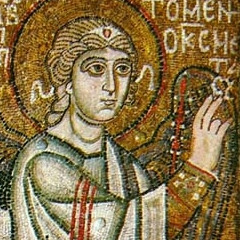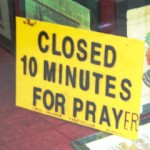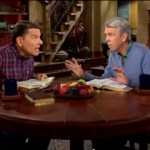
Last Wednesday Pope Benedict talked a bit about the spill he took earlier in July and the broken wrist he suffered.
“Unfortunately, my own guardian angel did not prevent my injury,” he said. The angel didn’t fall down on the job. He was “certainly following superior orders.” The upbeat pope added, “Perhaps the Lord wanted to teach me more patience and humility, give me more time for prayer and meditation.”
I’ve not really thought much about guardian angels since I was a kid, but I’ve been thinking a lot about them lately — probably why the pope story stuck out for me. In my prayers each day I recite Psalm 91, which says this about guardian angels:
Because you have made the Lord your dwelling place —
the Most High, who is my refuge —
no evil shall be allowed to befall you,
no plague come near your tent.
For he will command his angels concerning you
to guard you in all your ways.
On their hands they will bear you up,
lest you strike your foot against a stone.
They may not have borne up the pope in his recent tumble but, like he said, they were “following superior orders.” From various passages in scripture it’s clear that angels are sent by God to help accomplish his purposes in our lives. Here’s another example from the Psalms, the thirty-fourth:
This poor man cried, and the Lord heard him
and saved him out of all his troubles.
The angel of the Lord encamps
around those who fear him, and delivers them.
Angels feature in several Old Testament accounts. Take the story in Genesis 24 when Abraham sends his steward to fetch a wife for Isaac. Abraham tells him “The Lord … will send his angel before you, and you shall take a wife for my son….” And this one from Exodus 23, God speaking: “Behold, I send an angel before you to guard you on the way and to bring you to the place that I have prepared. Pay careful attention to him and obey his voice; do not rebel against him, for he will not pardon your transgression, for my name is in him. But if you carefully obey his voice and do all that I say, then I will be an enemy to your enemies and an adversary to your adversaries.”
The angels’ role in protection is again seen in the Gospels, when Jesus pulls a child to him to settle a dispute among the disciples about who was greatest in the kingdom of heaven. “See that you do not despise one of these little ones,” he says. “For I tell you that in heaven their angels always see the face of my Father who is in heaven” (Matthew 18).
The church fathers also talk about angels. In the sixth of his Miscellanies, Clement of Alexandria, who was born in 153 AD, mentions “regiments of angels … distributed over the nations and cities,” adding that some are “perchance … assigned to individuals.” Gregory of Neocaesarea, born in 205, spoke of “those beings who are not seen, but yet are more godlike, and who have a special care for men.” Riffing on the theme of the angel guiding and directing God’s people, as in Exodus 23, Gregory mentions that his angel “sustains, and instructs, and conducts me….” And Basil, more than a hundred years after Gregory, speaks in his book On The Spirit about angels being “set over men as tutors and guardians.”
Reading ancient Christian texts like these can also help trace the source of popular modern ideas — like the idea that we all have an angel on one shoulder and a devil on the other. Maybe the earliest example of this idea is from the second century book, The Shepherd of Hermas, which was regarded for a long time by some as scripture. It says, “there are two angels with a man, one of righteousness and the other of iniquity.”
John Cassian, born in 360, echoes the thought. “For Holy Scripture bears witness that two angels, a good and a bad one, cling to each one of us,” he says. For the good, Cassian cites the above passages from Matthew and Psalm 34 and alludes to the story from Acts when Peter was imprisoned by Herod, rescued, and came to stand at the gate of Mary’s house. The other disciples were convinced of his death. Herod had, after all, just killed James. So when the servant girl answered and came to tell the others that Peter was standing at the door, they replied: “It is his angel!” As for the angel on the other shoulder, Cassian cites Hermas, Satan’s tempting of Job, as well as Psalm 109, which he reads as a reference to Judas: “And let the devil stand at his right hand” (some translations say “accuser”).
I want to do a lot more reading on this subject, but for now my main takeaway is that God has not left us alone. Not only is he everywhere present, but his servants and messengers are with us too. So maybe the pope’s fall happened so he could have more time for meditation and prayer, like he said — and so that others of us could be reminded that there really still are, as Paul Simon put it, angels in the architecture.












